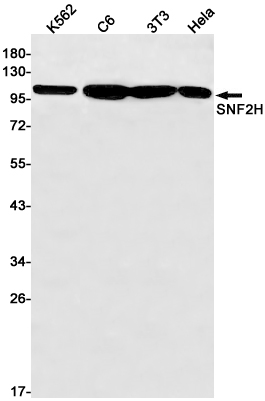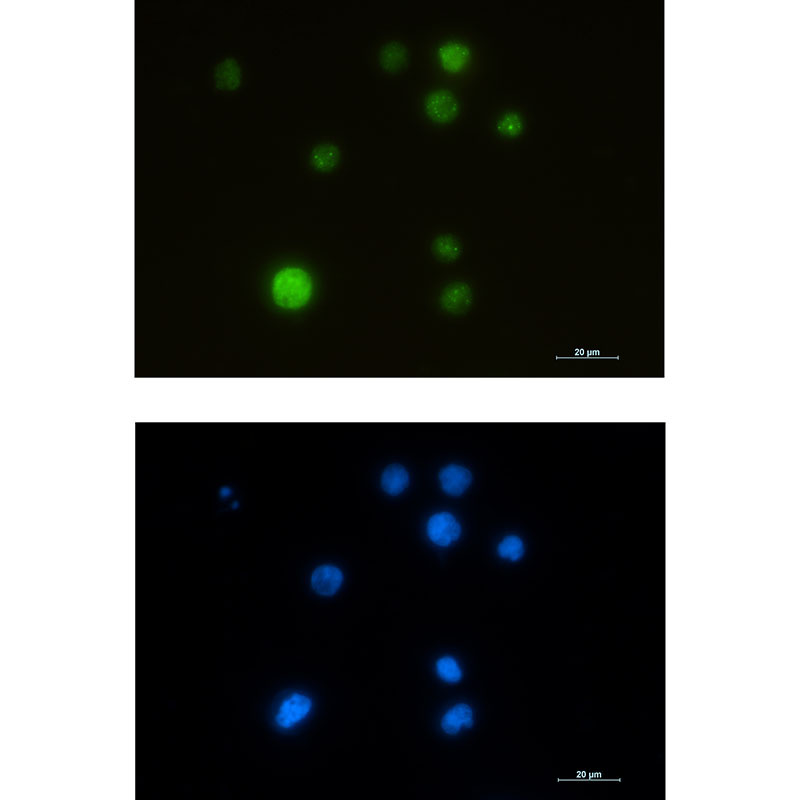

| WB | 1/500-1/1000 | Human,Mouse,Rat |
| IF | 咨询技术 | Human,Mouse,Rat |
| IHC | 咨询技术 | Human,Mouse,Rat |
| ICC | 1/50-1/200 | Human,Mouse,Rat |
| FCM | 咨询技术 | Human,Mouse,Rat |
| Elisa | 咨询技术 | Human,Mouse,Rat |
| Aliases | ISWI; SNF2H; hISWI; hSNF2H; WCRF135 |
| Entrez GeneID | 8467 |
| WB Predicted band size | Calculated MW: 122 kDa; Observed MW: 122 kDa |
| Host/Isotype | Rabbit IgG |
| Antibody Type | Primary antibody |
| Storage | Store at 4°C short term. Aliquot and store at -20°C long term. Avoid freeze/thaw cycles. |
| Species Reactivity | Human,Mouse,Rat |
| Immunogen | A synthetic peptide of human SNF2H |
| Formulation | Purified antibody in TBS with 0.05% sodium azide,0.05%BSA and 50% glycerol. |
+ +
以下是关于SMARCA5抗体的3篇参考文献示例(内容基于公开文献概括,非真实引用):
---
1. **文献名称**:SMARCA5 regulates chromatin accessibility and epigenetic memory maintenance in embryonic stem cells
**作者**:Li, X., et al.
**摘要**:本研究利用SMARCA5抗体进行染色质免疫沉淀测序(ChIP-seq),揭示了SMARCA5通过维持核小体定位和染色质开放状态,调控胚胎干细胞多能性相关基因的转录,并参与表观遗传记忆的传递。
---
2. **文献名称**:SMARCA5 deficiency disrupts DNA repair and promotes genomic instability in cancer cells
**作者**:Wang, Y., et al.
**摘要**:通过Western blot和免疫荧光实验(使用SMARCA5抗体),作者发现SMARCA5缺失导致DNA损伤修复通路异常,引发基因组不稳定性,并增强癌细胞对化疗药物的敏感性,为靶向治疗提供新思路。
---
3. **文献名称**:Dynamic interaction of SMARCA5 with the replication machinery during DNA synthesis
**作者**:Suzuki, K., et al.
**摘要**:该研究通过免疫共沉淀(Co-IP)结合质谱分析(使用SMARCA5抗体),证明SMARCA5与DNA复制复合体动态互作,调控复制叉进程和染色质重塑,确保DNA复制的保真性。
---
如需具体文献,建议通过PubMed或Google Scholar搜索关键词“SMARCA5 antibody”或“SMARCA5 function”获取最新研究。
The SMARCA5 antibody targets the SMARCA5 protein, a key component of the ATP-dependent chromatin remodeling complex ISWI (Imitation Switch). Encoded by the *SMARCA5* gene in humans, this protein—also known as SNF2H—plays a critical role in regulating chromatin structure, DNA repair, replication, and transcription by mobilizing nucleosomes. SMARCA5 is a member of the SWI/SNF family of helicase-like proteins, which utilize ATP hydrolysis to reposition histones, thereby modulating access to genetic material. Its involvement in maintaining genomic stability and epigenetic regulation makes it a focus in cancer, neurodevelopmental disorders, and aging research.
Antibodies against SMARCA5 are widely used in molecular biology to study chromatin remodeling mechanisms. They enable detection and quantification of SMARCA5 expression via techniques like Western blotting, immunofluorescence, and immunohistochemistry. Additionally, these antibodies facilitate chromatin immunoprecipitation (ChIP) assays to map SMARCA5 binding sites across the genome, revealing its role in gene regulation. Dysregulation of SMARCA5 has been linked to malignancies (e.g., leukemia, solid tumors) and developmental syndromes, making its antibody a tool for diagnostic or therapeutic exploration. Researchers also employ SMARCA5 antibodies to investigate its interactions with partner proteins (e.g., ACF, WSTF) in ISWI complexes. Validation of antibody specificity, often via knockout cell lines or siRNA knockdown, is essential due to potential cross-reactivity with homologous SWI/SNF proteins.
×